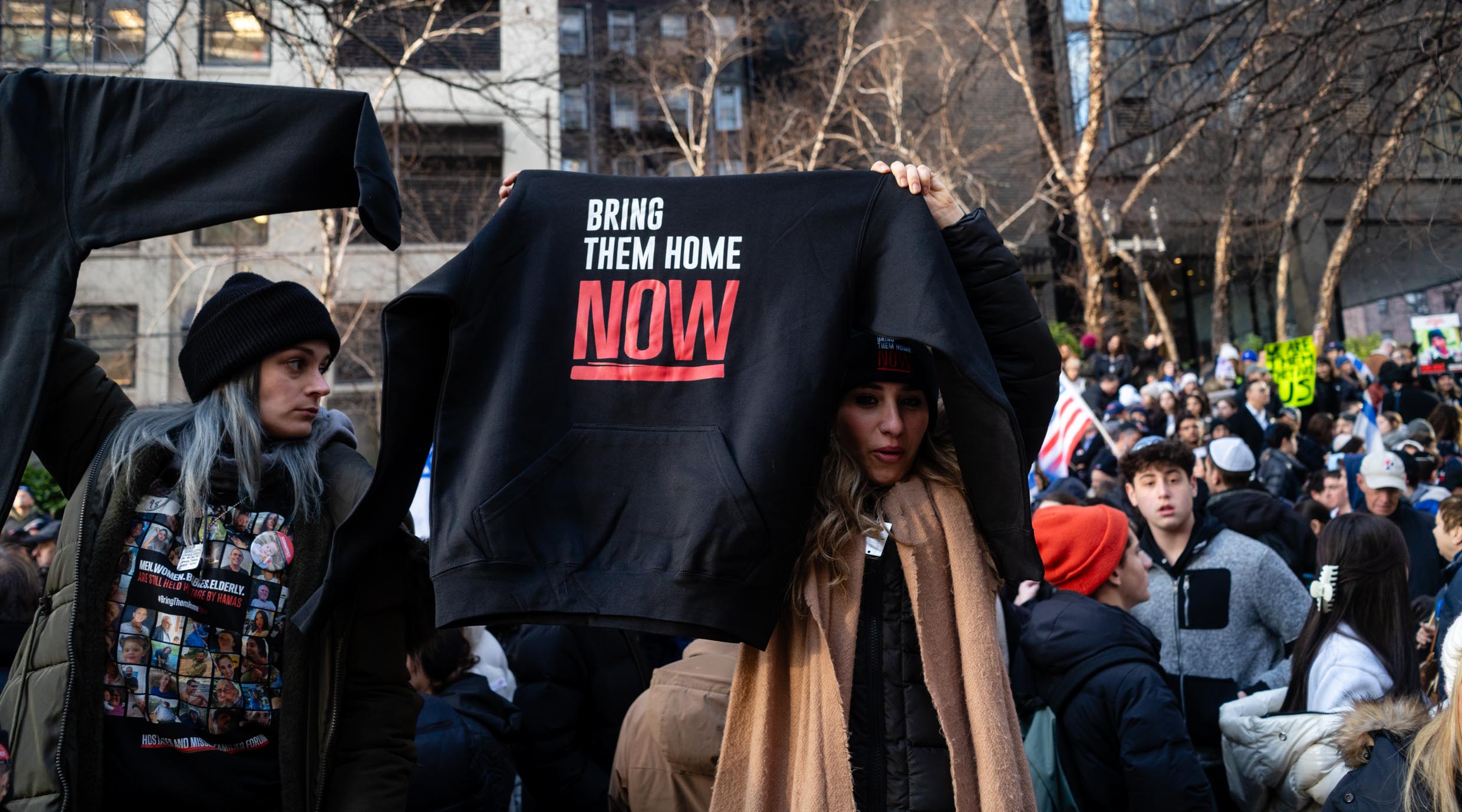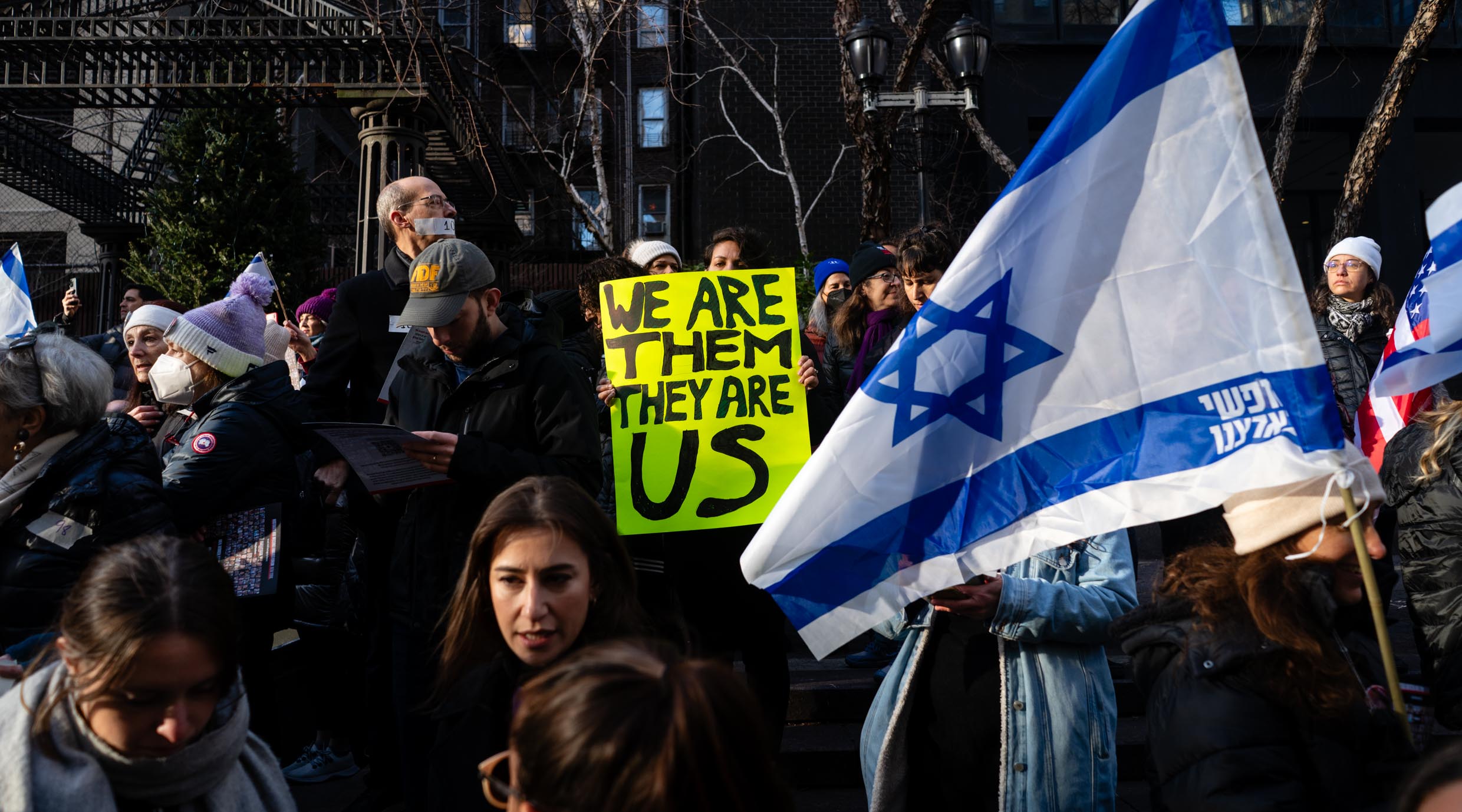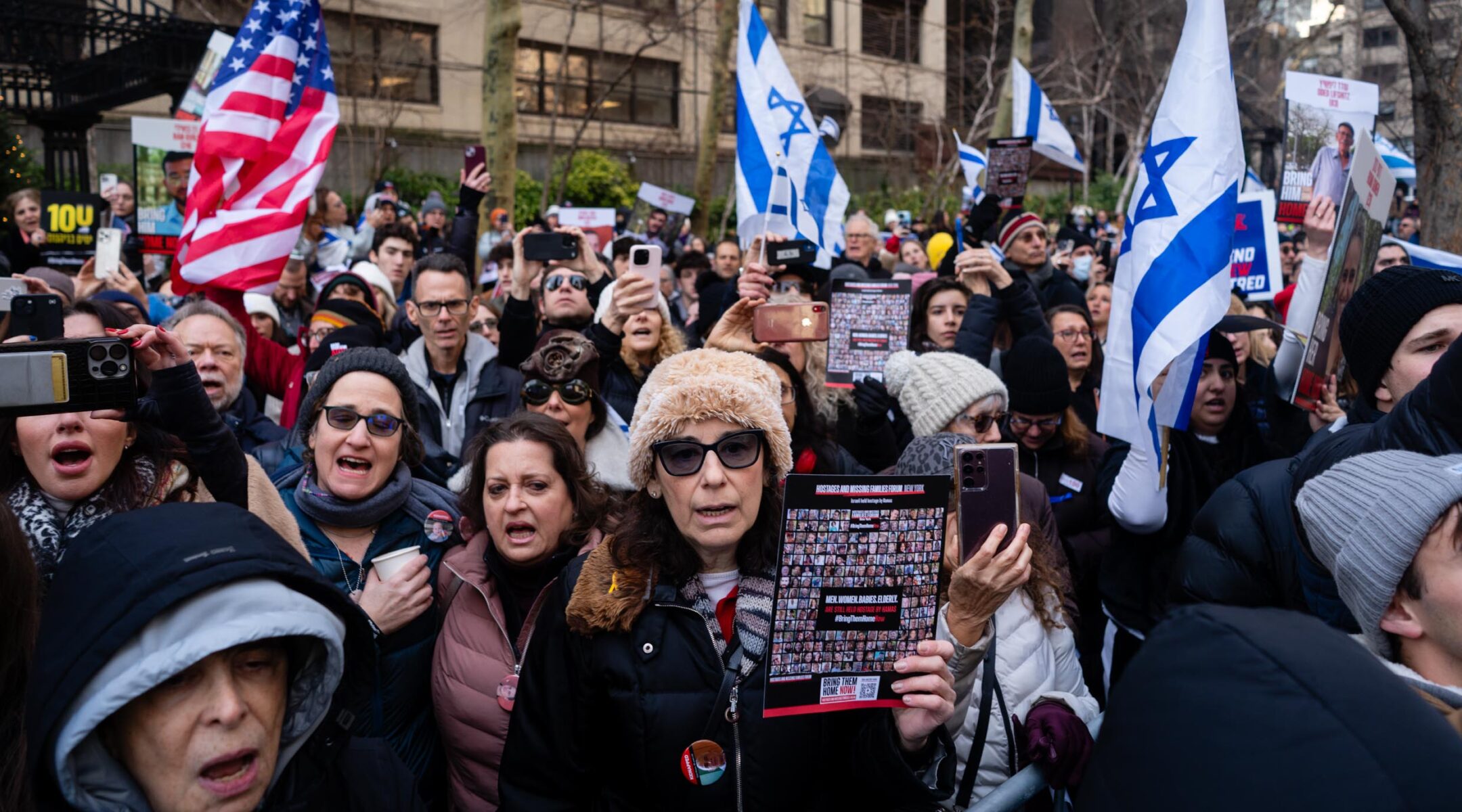(New York Jewish Week) – An Israeli child who was freed from Hamas captivity and relatives of those still held hostage addressed a crowd of thousands outside the United Nations at a rally marking 100 days since the terror group’s Oct. 7 invasion of Israel.
The rally featured Israeli and American flags and the singing of Israel’s national anthem, “Hatikvah.” Speeches mentioned Israel’s ongoing war against Hamas in Gaza. But most speakers — including New York Gov. Kathy Hochul and Sen. Chuck Schumer — focused their remarks on the plight of the hostages.
Hila Rotem Shoshani, 13, who was taken hostage from Kibbutz Be’eri, implored the crowd to keep pushing for the hostages’ release. Shoshani was taken captive along with her mother and a friend, and was released in an exchange deal in late November that saw more than 100 hostages go free. Organizers said her speech was the first by a former Israeli captive in the U.S.
“Life as a hostage in Gaza is not life, it is hell. I came all the way here to ask the whole world to help us bring back all of the hostages,” she said. “We can’t leave them there. Their families are waiting for them. Bring them home, please.”
In addition to carrying flags, attendees wore stickers saying, “Today is day 100,” and pins showing photos of the captives. Signs in Hebrew said, “100 days of hell,” and in English, “Let my people go.” At the start of the rally, participants held a moment of silence for the hostages for 100 seconds.
Volunteers in Midtown East’s Dag Hammarskjöld Plaza sold sweatshirts and beanies that said “Bring them home” to raise money for the Hostages and Missing Families Forum, one of the central groups advocating for the captives and an organizer of the rally. Organizers estimated that the demonstration drew 2,500 people.
Yair Moses, whose father, Gadi Moses, 79, is held hostage, described his anguish, saying he had been unable to eat or sleep since his father was taken. His voice broke at times during his speech.
“There are other elderly men there, like my father. No one knows if they will be able to recover from this, physically or mentally,” Moses said. “There are young women there. We have already heard witness accounts that tell of the horrors they have gone through and are still going through.”
He added, “Time is running out, and the longer they stay there the greater the risk to their lives.”

Demonstrators rally in support of Hamas hostages near the U.N., Jan. 12, 2024. (Luke Tress)
The demonstration was held in place of weekly Friday morning gatherings outside the home of U.N. Secretary General Antonio Guterres on behalf of the hostages. The rally kicked off a series of events in support of the hostages that will be held throughout the city over the weekend.
From Friday afternoon through Saturday night, an hourglass installation will sit in Times Square symbolizing that “time is running out” — a replica of a display in Tel Aviv.
On Sunday morning, the 100th day since Oct. 7, a “100 Days March” will take place in Central Park. Activists have been holding weekly Sunday running sessions in the park, part of a campaign in New York and other cities dubbed “Run For Their Lives.” Participants in the events will hold photos of the hostages and wear yellow ribbons, a symbol of the captives. The New York run will begin at Central Park West and 90th Street.
Also on Sunday, a separate event lasting most of the day in Washington Square Park will feature musicians playing songs at a yellow piano open to the public in honor of Alon Ohel, a 22-year-old pianist who is being held hostage.
In addition to Hochul and Schumer, a range of public officials, rabbis and Jewish organizational leaders from across the city attended Friday’s rally. The event was co-sponsored by a wide array of U.S. Jewish groups.
Hochul said she had been devastated during a visit to Kfar Aza, one of the communities hardest hit in Hamas’ attack, shortly after Oct. 7. She voiced support for Israel’s campaign against Hamas and decried the lack of attention to hostages in the public sphere.
“Why are not people across this world demanding the freedom of these hostages?” Hochul asked. “Where is the outrage? Where’s the daily coverage of the suffering of the hostages and their families?”
She continued, “I want them brought home now and I want the rest of the world to start saying the same thing because it is barbaric and inhumane to hold them one day longer.”

Demonstrators rally in support of Hamas hostages near the U.N., Jan. 12, 2024. (Luke Tress)
The crowd was composed largely of American Jews and included delegations from local Jewish high schools. Some attendees cried and embraced during the speeches. Jewish-Israeli singer Shimon Smith performed the song “Nigmar” (Hebrew for “It’s over”) by Israeli star Idan Amedi, the “Fauda” singer and actor who was badly injured in combat in Gaza this week. Amedi rose to prominence in 2010 with the song “Warrior’s Pain,” about a combat soldier struggling with PTSD.
Ellen Muss and Laura Green attended the rally holding milk cartons with images of the Hamas captives, part of an awareness campaign recalling efforts to locate missing persons. Muss’ carton bore the image of Kfir Bibas, the redheaded baby taken by Hamas who remains held in Gaza and who has become a symbol of the captives.
“We felt a very strong attachment to the hostages and it’s just keeping the awareness alive for everybody that it’s almost 100 days,” Muss said. She was in Israel several weeks ago and visited “Hostages Square” in Tel Aviv, an installation in support of the captives next to the Tel Aviv Museum of Art, where she met the sister of hostage Omri Miran and showed her photos of the milk carton campaign in New York.
“She was so touched to know that we’re still thinking about them,” Muss said. “This could have been you, your sister, your grandmother, and that’s what we have to tell people.”
The New York Jewish Week brings you the stories behind the headlines, keeping you connected to Jewish life in New York. Help sustain the reporting you trust by donating today.





